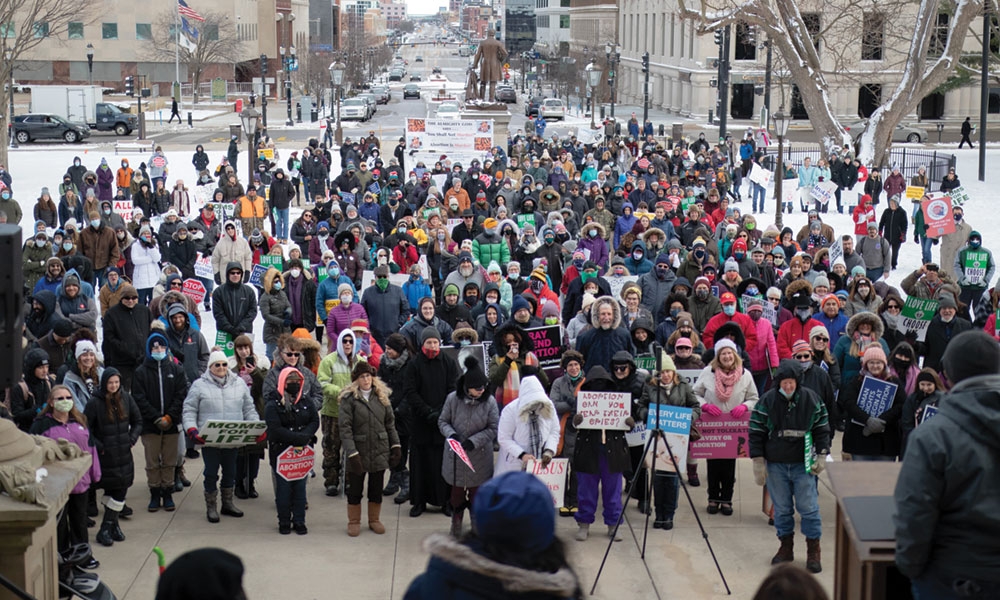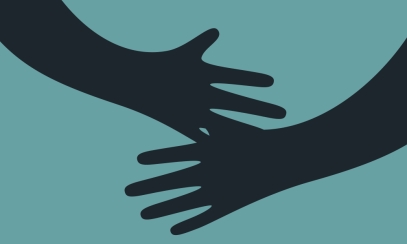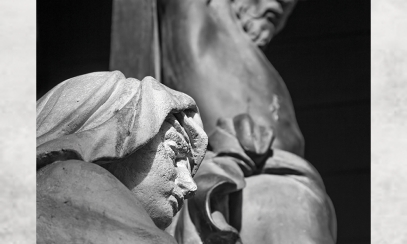
Modern-day Holy Innocents
What the Catholic Church believes about abortion
What the Catholic Church believes about abortion
Getting your Trinity Audio player ready...On Dec. 28th, we celebrate the feast of the Holy Innocents, the male children up to 2 years old living in and around Bethlehem, whom King Herod ordered to be slaughtered when the Magi inquired, “Where is the newborn King of the Jews?” (Mt 2:2,16) These boys were the first human beings to suffer martyrdom in saving the life of Jesus, the newborn king of the Jews, so that he was able to bring salvation to the world.
On Dec. 28th, we celebrate the feast of the Holy Innocents, the male children up to 2 years old living in and around Bethlehem, whom King Herod ordered to be slaughtered when the Magi inquired, “Where is the newborn King of the Jews?” (Mt 2:2,16) These boys were the first human beings to suffer martyrdom in saving the life of Jesus, the newborn king of the Jews, so that he was able to bring salvation to the world.
In his encyclical Centesimus Annus, St. John Paul II articulated a list of basic human rights in Catholic Social Teaching to which every human person is entitled by virtue of being created by God in his image and likeness. “The first right in this list is the right to life, from conception to its natural end which is the condition for the exercise of all other rights and, in particular, implies the illicitness of every form of procured abortion and of euthanasia.” (47) An integral part of the right to life is “the right of the child to develop in the mother’s womb from the moment of conception.” (ibid.)
The intentional taking of innocent human life has always been considered an offense against God and the natural moral law; it is also a social evil that violates each of the four principles of Catholic Social Teaching (CST): human dignity, the common good, solidarity, and subsidiarity.
CST informs us that there is a direct connection between the proclamation or assertion of human rights and the social duty and responsibility to acknowledge and support these rights.(Cf. Compendium of the Social Doctrine of the Church, 156) Abortion denies the rights of the innocent unborn child to develop in the mother’s womb, to be born alive, and to live in the context of a family that nurtures the continuing growth and development of this child, including education and a place of dignity in society. Abortion evades the duty and responsibility of society to respect and protect the right to life and the dignity of an unborn child, along with all other rights that come with being a living human person. In Evangelii Gaudium, Pope Francis declares, “This defense of unborn life is closely linked to the defense of each and every other human right. It involves the conviction that a human being is always sacred and inviolable, in any situation and at every stage of development.” (213)
Abortion harms the “common good” of society by denying the humanity of the most vulnerable persons and disrespecting the gift of life. The violation of the rights of some should be regarded as a violation of the rights of all. “The principle of the common good, to which every aspect of social life must be related, stems from the dignity, unity and equality of all people.”(CSDC, 163)
The abortion movement prizes women’s autonomy as the highest good, seeking for women freedom and equality with men, who cannot bear children. Remarkably, this dignity is not extended to unwanted, unborn children. Abortion supporters also believe medical decisions should be made with no reference to law or medical ethics, which any healthy society must have as its foundation. Like all moral evils, abortion is never a purely private affair; it has consequences that extend far beyond the woman and her doctor.
Abortion weakens the bond of solidarity and interdependence among human persons. Abortion undermines the principle of solidarity as a moral virtue since it is a sinful act and denies justice by taking away the life of the unborn child. (Cf. CSDC, 193) Living in solidarity with mothers and their unborn children requires us to help those in difficult circumstances, so that no woman or child is abandoned. Exercising subsidiarity in conjunction with solidarity would call upon families, parishes, and local communities to assist those in need, with help coming from the state and federal levels of government as needed. Solidarity and subsidiarity also encourage the adoption of unwanted children by loving, two-parent families. Pope Francis wrote, “Human life is never a burden. It demands we make space for it, not cast it off.” ( Let Us Dream: The Path to a Better Future, p. 115)
Viewing abortion through the lens of Catholic Social Teaching, we are able not only to appraise the negative impact of abortion on society, but also find a solution to the problem of unwanted pregnancies. Despite the 2022 amendment to the Michigan Constitution enshrining the “right” to abortion, Catholics and all people of good will are called to respect human life from its conception to natural death. “A society will be judged on the basis of how it treats its weakest members; and among the most vulnerable are surely the unborn and the dying.” (Pope St. John Paul II, Address to the New Ambassador of New Zealand to the Holy See, May 25, 2000)
Through the intercession of the Holy Innocents, we pray that all peoples, organizations, and levels of government will acknowledge and support these principles of Catholic Social Teaching, recognizing that each of us is made in the image and likeness of God, with innate dignity and an immortal soul. We must continue working to welcome and protect each new life into our world, regardless of the unjust laws and practices that are currently in place in our state.
Deacon Jim Kasprzak is a Deacon in the Diocese of Lansing, currently serving at St. Thomas Aquinas-St. John Student Center in East Lansing. He is the secretary of the Diocesan Commission on Catholic Social Teaching.



